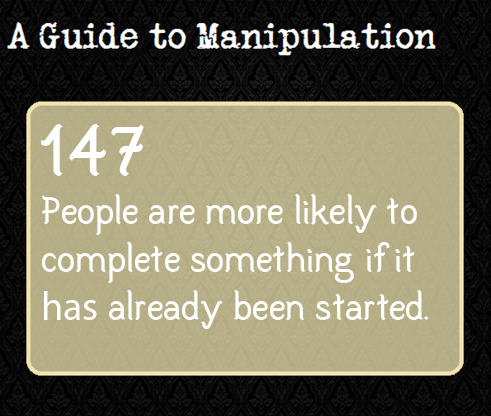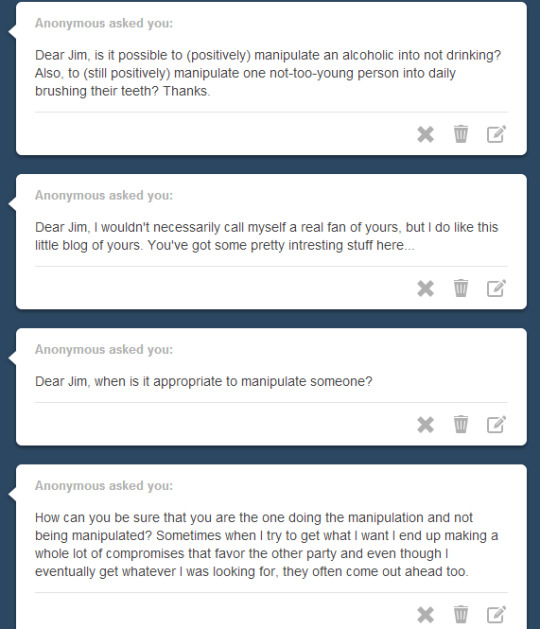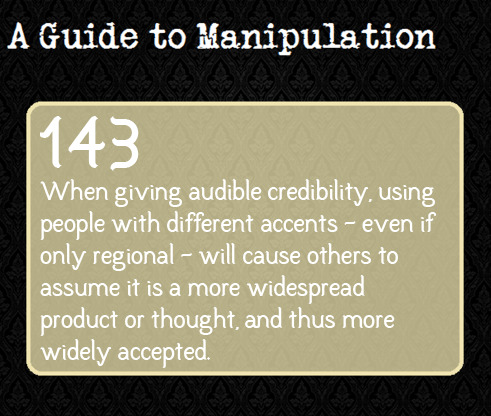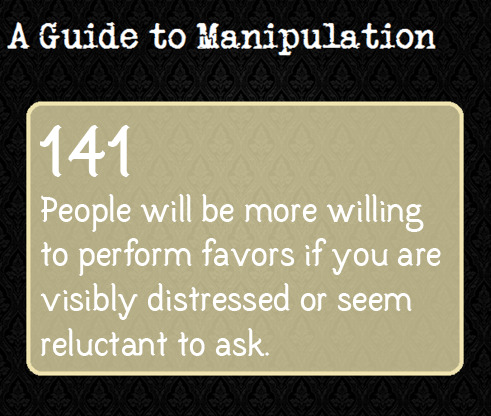Photo

Ever notice that when you receive a punch card for a certain product (come and purchase ice cream ten times and on your eleventh visit your purchase will be free), they start you with one or two slots punched out already?
People are more likely and more motivated to finish something if it has already been started for them. Combine this with other tips that have been covered here (like offering reward), and you're even more likely to get your target to comply.
JM
381 notes
·
View notes
Photo

In order:
Yes to both. However, positive influence in these cases would likely be better than outright manipulation. In terms of overcoming addiction, getting the addict to want to quit massively increases their chances of doing so; if it's at all possible, start with that. For the child, encouragement, education, and reward ought to do the trick.
Ta.
That wholly depends on your personal definition of 'appropriate', and I'm not delving into semantics. Personally, I say it's appropriate whenever I'm getting something out of it. Others may argue it's only appropriate when it has a positive outcome for all involved.
And that's why the example you gave is classified as compromise and doesn't necessarily mean you've been manipulated. Again, we could go into what 'manipulation' really means, but I've neither the time nor the patience.
JM
#a guide to manipulation#AGTM asks#(that's the tag to blacklist if you don't care to have asks on your dash)
113 notes
·
View notes
Photo

The 'gift' doesn't even necessarily have to be extravagant. For example: for waiters and waitresses, just giving mints at the end of a meal can increase your tip by over 20%.
That being said, it's not as simple as tossing a few candies onto the table and leaving.
In a study published in the Journal of Applied Social Psychology, researchers found that the method of leaving mints at the end of a meal affects the percentage of increased tips:
When waiters gave mints with the check and didn't call attention to the mints, tips increased about 3% against the control group where no mints were given at all.
Waiters who brought two mints by hand separate from the check and mentioned the mints to the table saw a 14% tip increase against the control group.
Finally, waiters who brought the check with mints, and then came back a short time after with more mints and mentioned them to the customers ("I thought you might like more mints!") saw a 21% increase in tips against the control group.
The 'personalisation' aspect of a gift is a big factor. If you're looking for a favour, first give some kind of gift that your target doesn't expect and that is personalised or shows special concern. You can get the same effect by doing a favour for your target before asking for a favour of your own, but the crux is to have it be unexpected, and to make them feel special.
JM
#manipulation#reciprocity#manipulate#a guide to manipulation#(you all should definitely send in some manipulation tips of your own#just putting that out there)
469 notes
·
View notes
Photo

This is due to the Licensing Effect (aka self-licensing, moral licensing). The Licensing Effect occurs when people make a good or virtuous choice that 'permits' them to make a bad decision later. An example of this would be someone on a diet believing that they've 'earned' an unhealthy meal by avoiding junk food during the week.
Convincing someone to make a 'bad' decision would therefore be easier after they have made a particularly good decision.
(See an article covering a study done on the subject of self-licensing here.)
JM
333 notes
·
View notes
Photo

Even something entirely unrelated. A study done by Alison Jing Xu and Robert S. Wyer revealed that "inducing participants to make supportive elaborations about a series of propositions activated a bolstering mindset that increased the effectiveness of an unrelated advertisement they encountered subsequently."
In other words, agreeing with something tends to make you more likely to agree with something else later. Make statements or represent a world view your target can agree with before introducing your message.
Mindset is everything.
JM
#manipulation#persuasion#manipluate#decision making#a guide to manipulation#(mod note: i'm moving house over the next few days and settling in after that so there may be no post on tuesday sorry!)
376 notes
·
View notes
Photo

Suggested by haaku.
220 notes
·
View notes
Photo

Consider the Serial Position Effect. Particularly helpful if you want to encourage memory of a particular detail, or hide something in a list of items, but keep in mind: items that 'stick out' in a list are most likely to be remembered (Von Restoff Effect).
JM
267 notes
·
View notes
Photo

"Opening with hesitation or an apology gives the responder an inclination to help. Reward them with a smile and relax your posture and muscles to appear relieved once they comply. Showing occasional vulnerability gains trust, used too often, and like anything it will lose its potency."
Suggested by Anonymous.
585 notes
·
View notes
Text
Obviously, the thing to do now is pretend that there wasn't an unannounced, year-long hiatus.
You can expect approximately bi-weekly posts for the foreseeable future!
A few notes:
Before asking a question, be sure to read the disclaimer in case your question can be answered there. Similarly, your question may have been answered in a past post.
If you're interested in suggesting a manipulation—which I highly encourage!—please try to give a source that validates it (an article, a study, etc) if applicable.
Given the sheer number of questions this blog has received in the past, not all messages will be answered. You do have a better chance of getting your message answered if you don't send it anonymously. In addition, messages received before the first of August have been deleted.
This is not an advice blog. This definitely is not a relationship advice blog. Please keep this in mind when sending messages!
ET, author of A Guide to Manipulation
#ET phoning home#is officially the mod post tag#a guide to manipulation#oh god has it really been a year#i'm so sorry
42 notes
·
View notes
Video
youtube

Keep in mind that this particular video covers mostly 'performance' pickpocketing, rather than 'street' pickpocketing.
This article, written by Adam Green (the man getting pickpocketed in the video), gives a bit more information about Apollo Robbins (the pickpocket in the video) and his methods.
Aside from sleight of hand, pickpocketing is largely about the nature of human attention and what it takes to misdirect that attention in your favour. Some important factors include:
Body language
Distraction
Eye contact (and lack of it)
Establishing trust
The illusion of control
Inattentional blindness
Understanding human behaviour
According to the article, Robbins "likes using the momentum of his victims’ own movements to remove things from their pockets rather than pulling them out himself. But physical technique, Robbins pointed out, is merely a tool. 'It’s all about the choreography of people’s attention,' he said. 'Attention is like water. It flows. It’s liquid. You create channels to divert it, and you hope that it flows the right way.' "
No matter how deft you may be at sleight of hand, it's ultimately the manipulation of human behaviour and attention that makes a good pickpocket.
JM
395 notes
·
View notes
Text
#okay don't get too excited but#new posts are in the near future#ET phoning home etc etc#BACK IN THE SADDLE#a guide to manipulation
23 notes
·
View notes
Photo

In a study done by Lotfus and Palmer regarding eyewitness testimonies, forty-five students were shown a clip of a car accident, then were asked a series of questions about the accident. The phrasing of these questions were slightly varied:
How fast would you estimate the car was going when it hit the other vehicle?
How fast would you estimate the car was going when it bumped the other vehicle?
How fast would you estimate the car was going when it smashed into the other vehicle?
The students were also asked if they remembered seeing broken glass in the clip.
When the word 'smashed' was used to describe the accident, the estimated speed was higher than when the word 'hit' was used. Similarly, more than twice as many people remembered seeing broken glass if the word 'smashed' was used rather than the word 'hit'.
The words you use can, in some cases, be used in a way to alter the way a person remembers something.
Diction is important.
JM
#A Guide To Manipulation#manipulation#memory#manipulate#(on an unrelated note I have about five quadrillion asks to sort through#I'm sorry I haven't been answering any but it's like the higher the buildup the less I want to tackle the pile#I'll man up about it soon I promise.)
509 notes
·
View notes
Photo

For example:
-Using no hand gestures can be perceived as indifference
-Keeping your hands hidden can lead to a lack of trust
-Hands open, palms up at a 45-degree angle communicates honesty and openness

-Hands open, palms down communicates certainty

-Hands open, palms at a 90-degree angle communicates expertise

Be aware of the gestures you make and what messages they convey. The smallest things can make or break a successful manipulation.
JM
#A Guide To Manipulation#manipulation#hand gestures#manipulate#(on an unrelated note obviously I should not be doing blog maintenance on no sleep in the past 48 hours#because I do stupid things like post a bunch of drafts I wasn't intending to#bear with me everybody I'm trying to get back into the swing of things)
1K notes
·
View notes
Photo
Oh, really. Well, far be it from me to argue, but I've seen surprised expressions on your face often enough to question your, ah, judgement of scenarios. 'Complacent' isn't quite the adjective I was thinking of.
JM

Oh, yes, of course, not idiotic enough to attack the unknown alone—
Except perhaps that time with the cabbie driver…

Or backstage at the Chinese Circus…

Or at the pool…

Or on the roof of St. Bart’s…

You are Mr Charges-off-alone-into-battle.
JM
351 notes
·
View notes
Photo

Oh, yes, of course, not idiotic enough to attack the unknown alone--
Except perhaps that time with the cabbie driver...

Or backstage at the Chinese Circus...

Or at the pool...

Or on the roof of St. Bart's...

You are Mr Charges-off-alone-into-battle.
JM
351 notes
·
View notes
Photo

Suggested by beyond-the-wand.
259 notes
·
View notes
Note
Dear Jim: you've given advice for what to do if someone bigger than you is being aggressive. What if you're very small and want (or need) to menace people bigger than you? My reputation for being ruthlessly violent and somewhat cruel has followed me through a few of my social circles, but people who haven't actively witnessed it (due to social appropriateness, normally) don't tend to take me as seriously because I'm so small.
I've found that coming off as slightly unbalanced is enough to unnerve even the toughest of people.
JM
155 notes
·
View notes